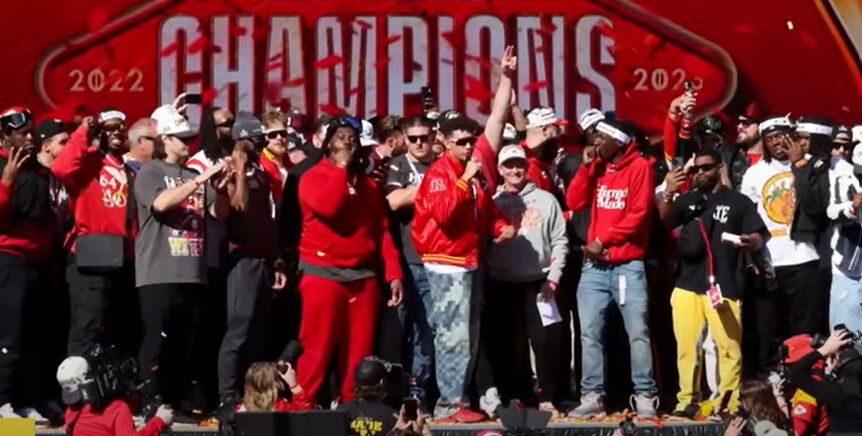In the aftermath of a tragic shooting in Kansas City, the decision by Patrick Mahomes, Travis Kelce, and other members of the Kansas City Chiefs to attend a celebration at the Granfalloon Restaurant And Bar has sparked a wave of criticism for its perceived insensitivity. The event, spearheaded by Mahomes just days after their Super Bowl victory, was meant to be a continuation of the team’s celebrations. However, given the timing—occurring mere hours after the city was shaken by violence—the celebration has raised questions about the awareness and empathy of these high-profile athletes toward the community and the families affected by the shooting.
The gathering, which saw Chiefs players including Kelce making their way into the establishment, was indeed a high-spirited affair, complete with crowd control provided by local law enforcement. While images and reports have surfaced showing a seemingly joyous atmosphere, with Kelce obliging officers’ requests for selfies, the broader context casts a shadow over the festivities. It’s this juxtaposition of celebration against the backdrop of community grief that has left many feeling that the event was ill-timed and showed a lack of consideration for the victims and their loved ones.

It’s important to note that life, with its complexities, does not halt in the face of tragedy. Celebrations, milestones, and human connections continue to weave through the fabric of our daily existence. However, when public figures, especially those as influential and admired as professional athletes, choose to engage in festivities so soon after a community has experienced loss, it magnifies the actions taken and the choices made.
The Chiefs’ victory in the Super Bowl is undoubtedly a momentous occasion, deserving of recognition and celebration. Yet, the decision to proceed with a public gathering in the immediate aftermath of a shooting incident calls into question the sensitivity of these celebrations. It prompts a reflection on the role of public figures in acknowledging and responding to the collective mood of their communities, especially in times of sorrow.
This incident serves as a reminder of the delicate balance between personal joy and communal respect. For the victims’ families and those touched by the tragedy, the sight of a public celebration could feel like a disregard for their pain and loss. While it’s unlikely that any disrespect was intended by Mahomes, Kelce, or their teammates, the perception of such actions can deeply affect those who are grieving.
As Kansas City navigates the aftermath of this tragedy, the conversation around the Chiefs’ celebration highlights the broader implications of timing, empathy, and public perception. It underscores the need for sensitivity and awareness, not just from our leaders and public officials, but from all individuals, particularly those in the spotlight. In moments of collective grief, the actions of high-profile community members can either serve to unite and heal or inadvertently deepen the wounds felt by many.




